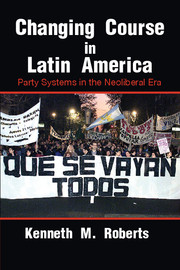Book contents
- Frontmatter
- Dedication
- Epigraph
- Contents
- List of Figures
- List of Tables
- Preface and Acknowledgments
- List of Abbreviations
- 1 Introduction: Party System Change in the Neoliberal Era
- Part I Explaining Regional Patterns
- 2 Partisanship and the Puzzle of Party System Stability
- 3 Critical Junctures and Party System Change
- 4 Antecedent Conditions: Party System Differentiation in 20th-Century Latin America
- 5 Neoliberal Critical Junctures and Party System Stability
- 6 Programmatic (De-)Alignment and Party System Stability in the Aftermath Period
- Part II National Experiencesin Comparative Perspective
- Appendix Election Results in Latin America
- References
- Index
2 - Partisanship and the Puzzle of Party System Stability
Published online by Cambridge University Press: 18 December 2014
- Frontmatter
- Dedication
- Epigraph
- Contents
- List of Figures
- List of Tables
- Preface and Acknowledgments
- List of Abbreviations
- 1 Introduction: Party System Change in the Neoliberal Era
- Part I Explaining Regional Patterns
- 2 Partisanship and the Puzzle of Party System Stability
- 3 Critical Junctures and Party System Change
- 4 Antecedent Conditions: Party System Differentiation in 20th-Century Latin America
- 5 Neoliberal Critical Junctures and Party System Stability
- 6 Programmatic (De-)Alignment and Party System Stability in the Aftermath Period
- Part II National Experiencesin Comparative Perspective
- Appendix Election Results in Latin America
- References
- Index
Summary
More than thirty years after the onset of Latin America’s “third wave” of democratization, the fragility of partisanship in the region remains a major puzzle. This fragility is especially puzzling when new democratic regimes have proven to be far more durable than anyone could have imagined when the third wave began (Mainwaring and Pérez-Liñán 2005). Historically, the oscillation between democratic and authoritarian regimes interfered with the institutionalization of party systems in the region (Lupu and Stokes 2010). Authoritarian rule led to frequent proscriptions or repression of specific party organizations (especially populist or leftist parties with working-class constituencies), as well as prolonged interruptions in electoral competition that disrupted parties’ efforts to recruit members, organize local branches, and construct collective identities. Consequently, as new democratic regimes demonstrated a surprising ability to withstand the region-wide economic crisis of the 1980s, scholars expressed optimism that party systems would institutionalize alongside them (Dix 1992).
In much (though not all) of the region, this institutionalization did not occur. Democratic regimes gradually consolidated and economies eventually recovered from the debt crisis and hyperinflation, but party systems, on average, did not become more electorally stable. To the contrary, they actually became progressively less stable during the first three decades of the third wave. Simply put, regular electoral competition did not institutionalize party systems as representative bodies or intermediaries between citizens and states.
- Type
- Chapter
- Information
- Changing Course in Latin AmericaParty Systems in the Neoliberal Era, pp. 19 - 40Publisher: Cambridge University PressPrint publication year: 2015

